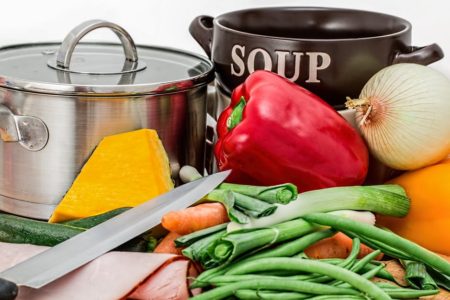
As if facing a life time with a brain injury isn’t enough, you become more likely to have other accidents. Everyone will have accidents, that’s just being human. But brain injury survivors are at higher risk of injuring themselves. Yesterday I did another one, that was easily preventable. The proof is in the pudding, or in this case the soup. My partner James had popped out, and I decided to heat up some soup for my lunch. What happened next was a series of poorly thought through decisions.
I went to pour it into a bowl, even though I saw it was bubbling and therefore boiling. My terrible coordination meant I made a bad job of it, and it splashed back up over my hand. I went to flick to off my hand with a sharp shake, which was only partially successful. As I’d shouted when it happened, my cat Dexter woke up and decided it was time for his lunch too. I have basic first aid training, so I know speed at cooling a burn is important. However, I chose to feed Dexter first. How ridiculous is that? And as some had spilt on the work top and floor, I cleaned that up too before running cold water on my burning hand.
Was My Brain Injury to Blame For Yet Another of My Accidents?
Not necessarily, but in all likelihood it probably played a role in it. We can all be careless at times, but my response at every stage was inappropriate. So now I am paying the price with my hand crisping up nicely. The back of my hand is red and delicate, but the worst is my inner wrist. It now sports some go faster stripes, complete with blisters for 3D effect.
So here’s a few tips on avoiding the most common accidents at home. They might sound obvious, but train yourself into good habits. If you have good habits, your more likely to respond in a safe way to things. Rather than try to fall back on your problem solving and decision making skills like I did.
Tips to Avoid Accidents at Home, With or Without a Brain Injury:
- Be mindful of hot liquids. Don’t place hot drinks for example on table runners which hang over the edge. They can easily be pulled accidentally, causing spillage.
- Turn in handles of pots and pans when cooking. A handle sticking out over the edge of the hob can easily be knocked and the hot contents to cause an injury.
- Any spills should be cleaned up quickly. This is to prevent them causing anyone to slip and fall. However, make sure that if the spill happened due to you causing an injury to yourself, deal with your injury first and ask for help.
- Install grab rails. Bathrooms are a must for grab rails as the slippery surfaces make falls all too likely. But make sure other areas of the house has been thought about too. Often I slip in the kitchen, but it’s tiny so I can grab the work surfaces. If yours is more generous, think of what would help you if you lost your balance.
- Keep electronics and water at a safe distance. Things can be dropped or pushed accidentally into water. This can make them short out and as water is a good conductor it can result in electrocution.
- Secure rugs. You might remember me talking about rug grippers before in 5 steps to end time consuming indecision of brain injury. These simple, inexpensive items could be the difference between a nasty fall or not.
- Best practice for your stairs. Make sure carpets are properly installed making them secure. The hand rail should run the entire length of the stairs, and you should be in the habit of always using it. Avoid placing rugs at the top or bottom of the stairs, as they increase the risk of a fall. (Even with grippers.)
- Don’t overload sockets. You must never be tempted to plug an extension cable into another extension cable. This could cause a fire.
- Never leave a naked flame unattended. Candles must be kept away from flammable objects. Curtains are a common household item that can quickly catch fire.
- Have a plan for if there’s a fire. Install a smoke detector and regularly check the batteries. Make sure you know how to exit the building, bearing in mind the obvious ones might be obstructed by the fire. Have keys for the doors where anyone staying in your home can access them so they can easily unlock the door to exit quickly.
In December 2014 I had a car accident on my way to work. I was driving on a duel carriageway that I used everyday but I don’t remember anything about it. Since I have learned that a Buzzard swooped down and smashed the windscreen of a small truck that was travelling behind me. As I was approaching queuing traffic I had started to slow down but the driver of the truck didn’t see that as he was struggling with his smashed windscreen. He hit the back of the company Smart car I was driving and pushed me into the central reservation. As a result the road was closed for hours and I was air lifted to the Royal London Hospital. I spoke in a strange high pitched voice and found I struggled to find words. Apparently every day I was asked to remember 4 words: red, velvet, horse, church for a few minutes. But never once did I recall them all. I was in hospital for 10 days. However never within that time was I told I had a brain injury or what I should expect.
Therefore, I feel that if I can help someone by making sure they have better access to information than I did. If talking about my experience achieves this, then I will have gone through it all for a reason.
Submitted by: Michelle Munt, MVA Survivor & Blogger
Michelle Munt blogs about her brain injury and is a true inspiration. Please visit her site: www.jumbledbrain.com as she shares her own journey as well as insightful information.
We welcome Michelle Munt as a member of Crash Support Network and thank her for her support.
The Crash Support Network is a unique website consisting of an online support group, a Crash Survivor Blog written by a survivor, our Sharing Our Recovery Newsletter, informative articles and a Virtual Crash Memorial. Our website is based on relationship-building and puts the needs of survivors first by creating a helpful resource for victims and survivors of motor vehicle crashes.



